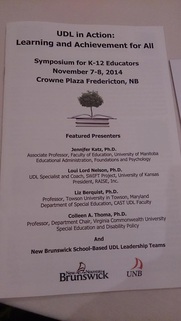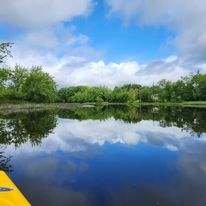
By Jana Nicol
For a brief moment in November 2014, The Crowne Plaza Hotel in Fredericton, New Brunswick was converted into a mecca for UDL enthusiasts. Educators from all over the province attended the UDL In Action conference to see leading UDL experts, including: Jennifer Katz, Loui Lord Nelson, Liz Berquist, and Colleen Thoma. The N.B. action research teams also gave presentations, including our team The UDL Project.
It was incredible to see hundreds of dedicated teachers sacrifice a Friday night and Saturday to learn more about UDL. It was so energizing to be surounded by so many people who share my love of Universal Design for Learning. If I ever worried, even for a moment, that New Brunswick teachers weren't buying into UDL, this conference and its attendees proved that UDL is catching on in a big way, which is so exciting!
One thing I took away from the conference was a renewed appreciation for the importance of social and emotional learning. Teachers often get so bogged down by curriculum that we may not always give social and emotional learning the time it deserves. If we step back for a moment and consider what is truly important for children to learn, in the grand scheme of things, and put those things on a list, what would we see? Jennifer Katz has done this exercise with administrators and educational leaders on an international scale. And it's interesting that not one of them ever said things like 'know their multiplication facts', or 'write a recount'. Instead, they believe what's truly important for students to learn is knowing how to 'work collaboratively', 'treat others with mutual respect', or 'participate in a democracy', among many other things that you may not find in a curriculum document. Considering this, we need to make more room for social and emotional learning in our classrooms. With some creativity, we can do this while also targeting curricular outcomes!
Another idea that suck with me is that we need to stop thinking of UDL as a special education movement. Designing instruction to be inclusive does not mean including those who have diagnoses or labels, rather it is about making learning accessible to everyone. The 'average' learner is a myth, therefore we must discontinue the practice of designing a lesson for what we believe most students will be able to do (and then tweak it here and there in the name of differentiation). Putting students in the same room is not enough. That's not inclusion, it's geography. If we recognize from the beginning that all students are unique in their learning styles, interests, and abilities, and design our lessons accordingly, only then will we be able to include, challenge, and engage all of our students in a UDL framework. Is it a lot of work? Yes. But it's worth it!
I could go on an on about all of the incredible ideas I heard throughout the conference. But I think it would be more interesting to show snippets from our social media presence. Here is a collection of some live tweets from the conference. If you'd like to see more, search for #UDLinAction on Twitter.
| |
| |
| |
| |
| |

